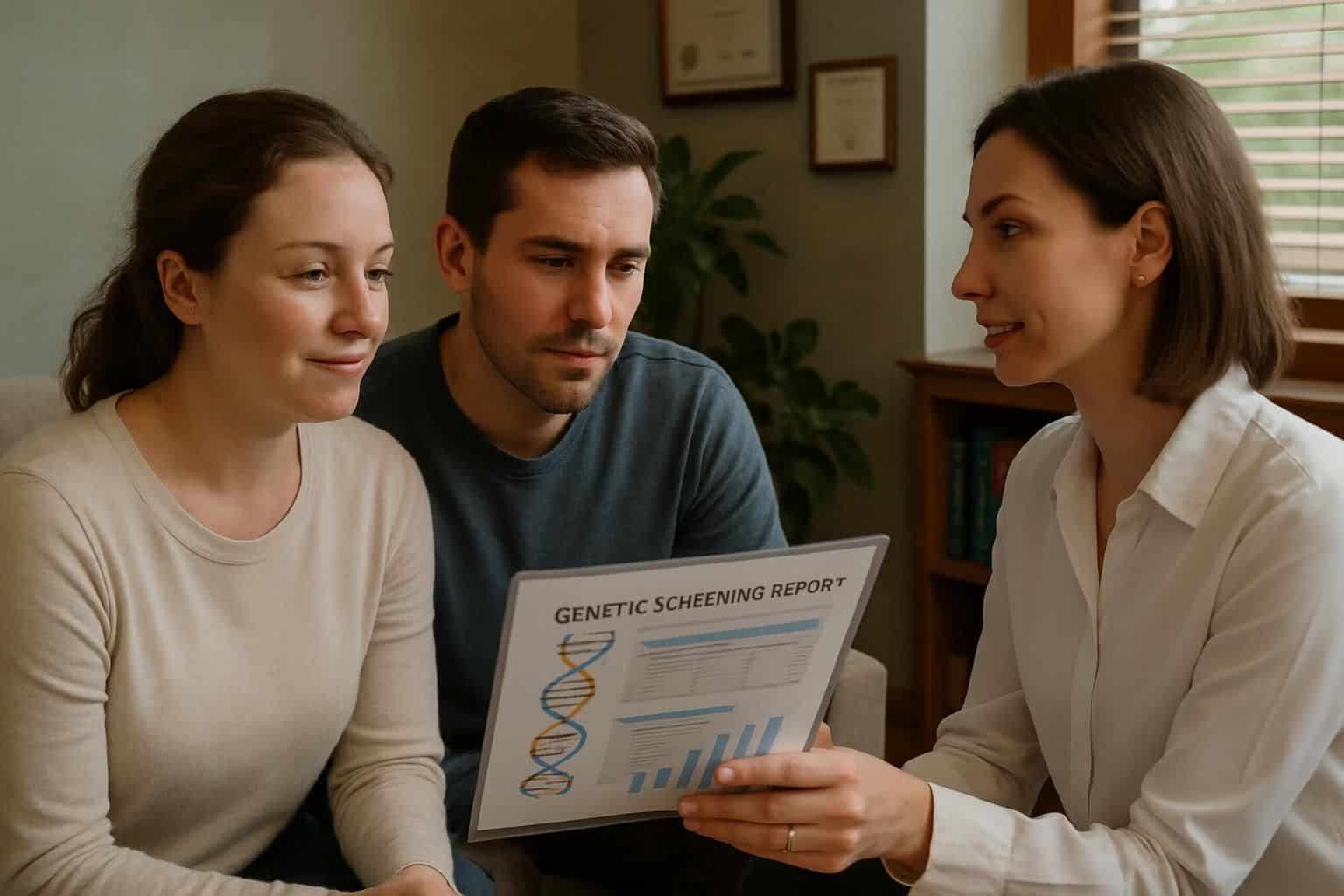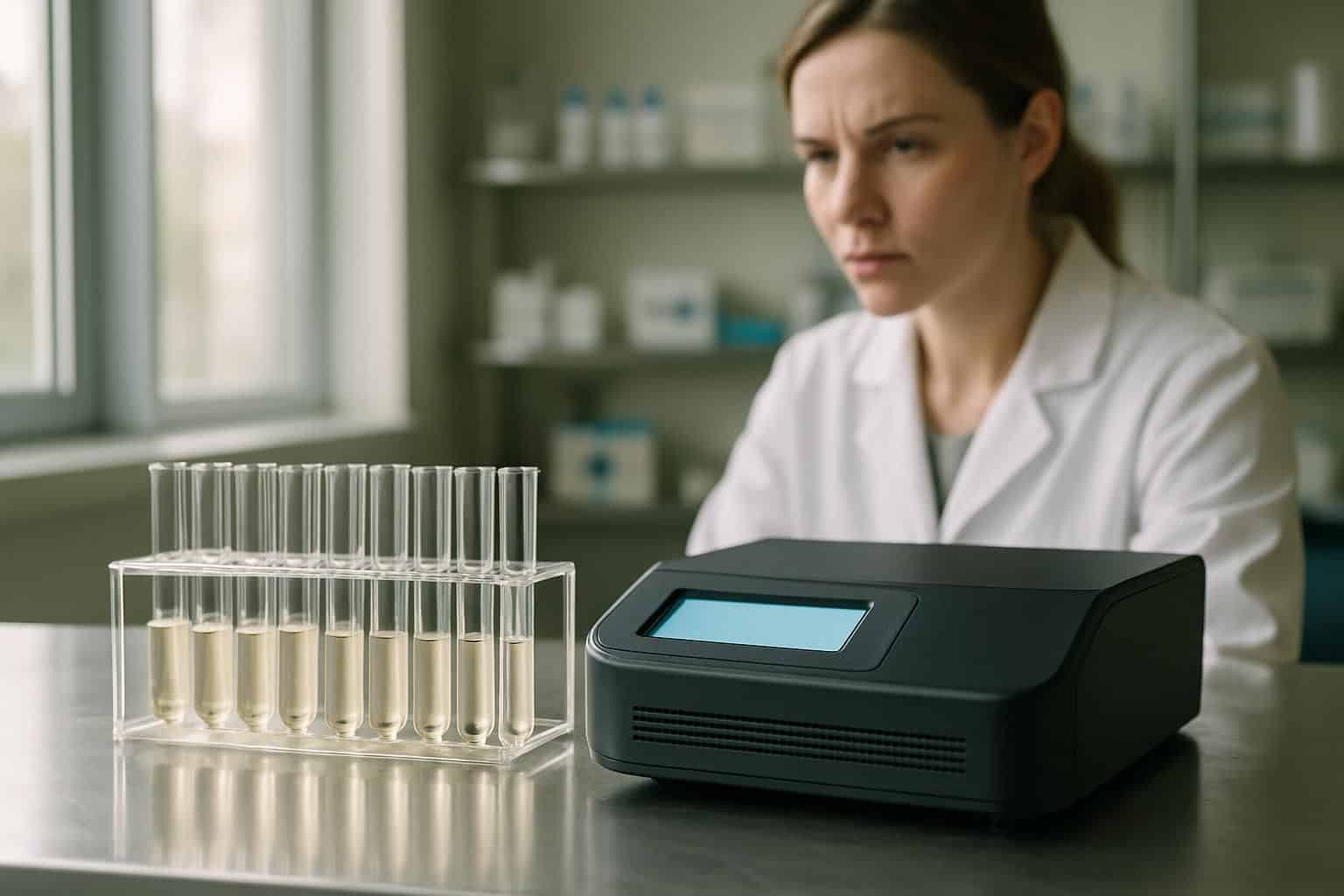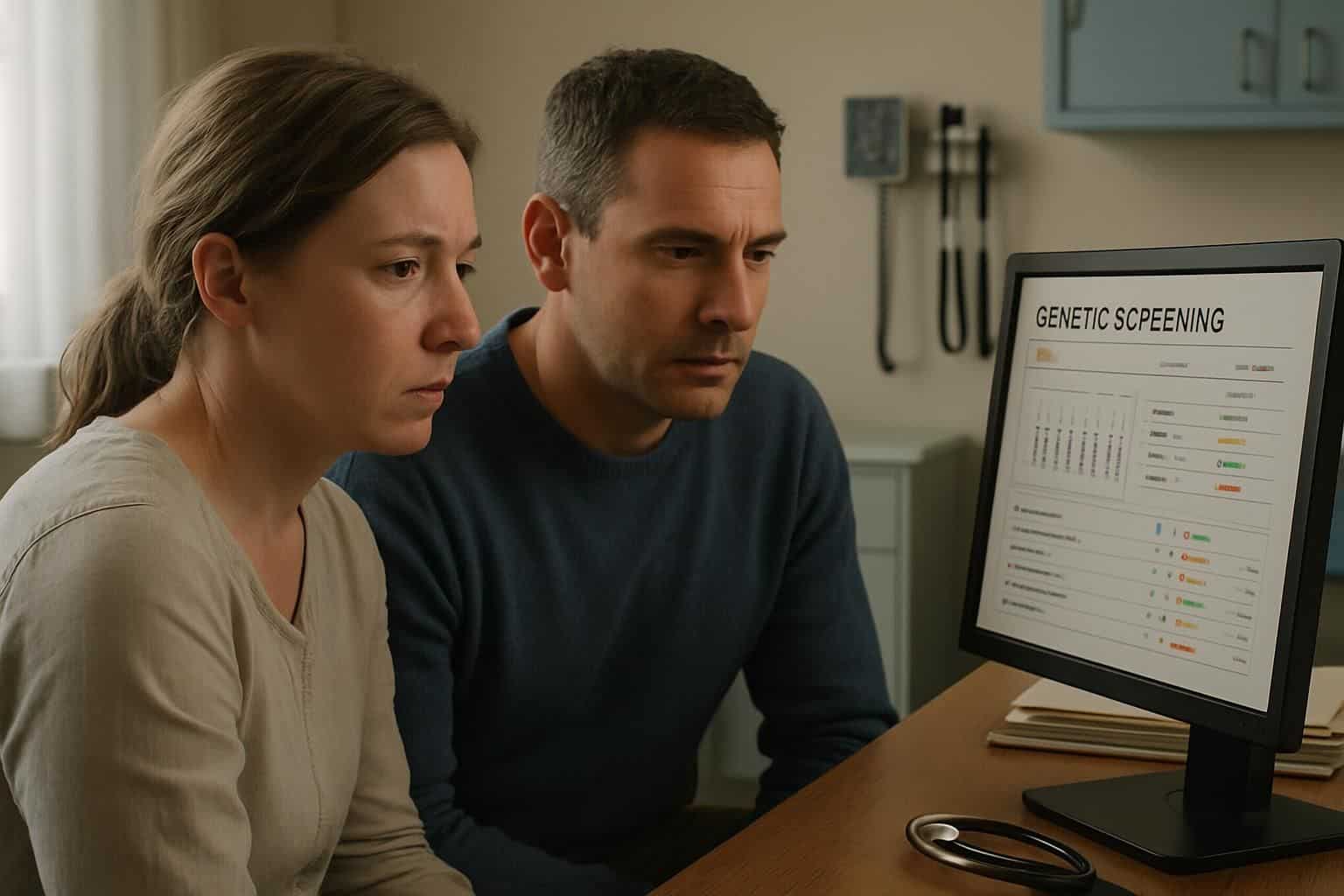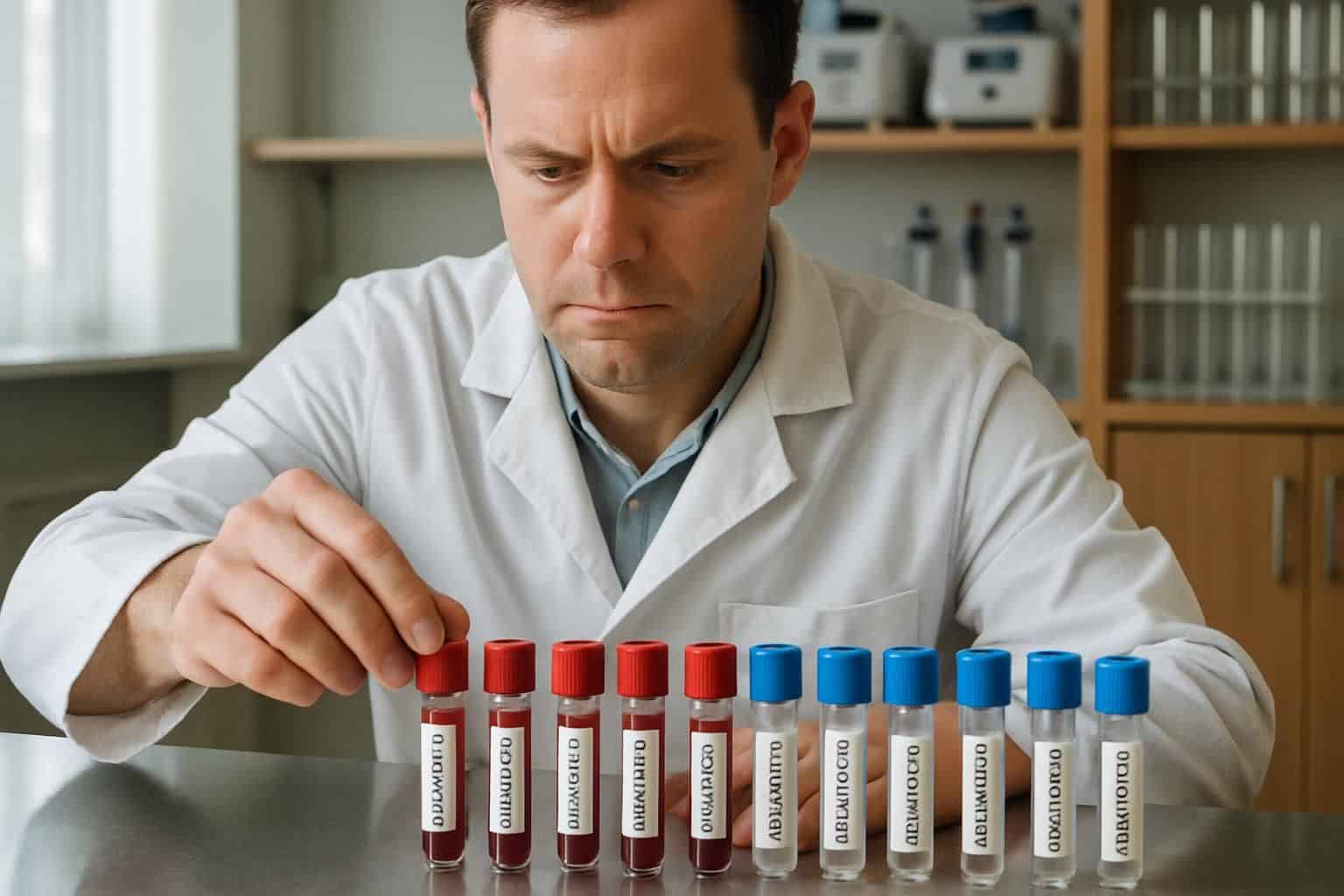Worried about passing genetic disorders to your baby? Genetic screening before pregnancy helps find out if parents are carriers for conditions like cystic fibrosis or sickle cell anemia.
This guide shares 13 clear facts to reduce fears and help you plan a healthy pregnancy. Read on to erase your doubts and feel confident in your next steps.
Key Takeaways
Genetic screening before pregnancy uses simple saliva or blood tests to check if parents carry genes for conditions like cystic fibrosis or sickle cell anemia.
These screenings can identify risks for over 500 inherited conditions—giving couples extra time to plan, consider IVF, or pursue genetic testing of embryos.
A child faces a 25% risk of inheriting the disorder if both parents carry the same genetic mutation.
Some genetic conditions occur more commonly in certain groups—Tay-Sachs shows up often in Ashkenazi Jewish families, and people with African or Mediterranean roots have increased risk for sickle cell anemia.
Preimplantation genetic testing during IVF lets doctors examine embryos before transfer—allowing couples to choose embryos without genetic issues.
Table of Contents
What is Genetic Screening Before Pregnancy?

Genetic testing before pregnancy can help couples discover if they carry genes linked to inherited conditions. The process is simple—a blood or saliva sample reveals certain genetic markers.
Carrier screening can identify potential risks for conditions—such as cystic fibrosis, spinal muscular atrophy, and sickle cell disease—before you conceive. Many parents opt to have these optional screenings to prepare for a healthy pregnancy and make thoughtful choices about planning their family.
Knowledge is power in family planning and genetic health.
These screenings can detect if you or your partner carry genes that might impact your baby’s health. The tests check for more than 100 genetic disorders, including Down syndrome, trisomy 13, and spina bifida.
For couples thinking about assisted reproductive treatment, genetic testing provides useful insights into possible risks.
This information can help you talk openly with your doctor or genetic counselor, making early planning easier and less stressful.
Why Consider Genetic Screening?

Genetic screening helps you know your risk factors before trying to get pregnant. This simple test can show if you or your partner carry genes for health issues that could affect your baby.
Understanding genetic risks
Your genes carry information that may lead to certain health conditions in your child. These genetic risks stem from DNA changes within you or your partner. Doctors use carrier screening tests to identify these risks, often before pregnancy begins.
These screenings search for genetic mutations connected with disorders such as cystic fibrosis and sickle cell anemia. Results won’t guarantee your child will have any specific illness—they simply indicate if you or your partner carry genes linked to health issues.
Family background can strongly influence genetic risk. If certain health problems appear frequently in your family, your risk of passing them on increases. Ethnicity can impact things too—people of Mediterranean descent, for example, face higher instances of beta thalassemia.
Women older than 35 also encounter higher odds of having children with chromosome issues like Down syndrome. Early testing offers time to explore options, plan carefully, and discuss possibilities with a genetic counselor.
Identifying carrier status for genetic disorders
Carrier screening tests can tell you if you carry genes linked to certain health conditions—ones that may affect your future baby. These tests detect over 500 genetic disorders, helping you identify any potential concerns before pregnancy begins.
Even if you feel healthy, you might still carry a gene and pass it on to your child. If just one parent carries a specific genetic trait, the child has a 50% chance of becoming a carrier as well.
But if you and your partner both carry that same gene, your child faces a 25% chance of developing the actual disorder.
Testing itself is painless and easy, typically requiring only a simple saliva test or quick blood sample. Before trying to have a baby, I got tested—and honestly, the relief I felt knowing my carrier status was huge.
Women with genetic disorders running in their families especially benefit from this kind of test. Mothers who carry disorders linked to the X chromosome face unique worries, as their sons hold a 50% risk of inheriting the condition.
You can choose to do carrier screening either before getting pregnant or once pregnancy has started, giving you flexibility and choices.
Knowledge is not just power—it’s peace of mind. Understanding your carrier status transforms uncertainty into informed choices for your family’s future.
Planning for a healthy pregnancy
Knowing your genetic status helps you plan ahead for a healthy pregnancy. Genetic screening gives you clear results, so you can figure things out before your baby arrives. Many couples rely on this screening to decide their next moves.
These screening tests can identify more than 500 genetic disorders that could affect your child. If both partners find out they carry the same genetic issue, there’s enough time to explore different paths.
Options could include IVF with genetic testing, donor eggs or sperm, or even adoption. Some women I’ve helped felt relieved after getting their results—even if the tests confirmed they were carriers.
They liked having clear answers early, giving them time to decide what’s best for their family’s future. Your doctor can also guide you on which prenatal tests you might need during pregnancy, depending on your screening results.
Common Conditions Detected by Genetic Screening

Genetic screening spots serious conditions like cystic fibrosis, spinal muscular atrophy, sickle cell anemia, and thalassemia—even before you get pregnant. Early detection gives you extra time to consider your choices, talk things through, or plan next steps. It helps you prepare emotionally and practically, giving you greater peace of mind as you start planning your family. This proactive step means you’re ready ahead of time—you’ll feel more supported and in control along the way.
Cystic fibrosis (CF)
Cystic fibrosis affects roughly 1 in 3,000 babies born in the United States. It’s a genetic condition caused by changes in a gene called CFTR. People with cystic fibrosis produce thick and sticky mucus, which clogs their lungs and blocks their pancreas.
Thankfully, better treatments today help many people with CF live into their 30s, 40s, or even longer.
Parents can easily check if they’re carriers with a quick blood or saliva test. This test identifies common CFTR gene mutations responsible for CF. Doctors often encourage couples planning pregnancy to get screened for cystic fibrosis carrier status.
Surveys indicate most adults approve of this kind of genetic testing.
If one parent tests positive, it doesn’t automatically mean their child will have CF. Both parents must carry the mutated gene for a child to inherit cystic fibrosis. If you and your partner both test positive, options exist—including specialized IVF techniques to test embryos before pregnancy starts.
Another important condition genetic screening can identify is spinal muscular atrophy—let’s talk about that next.
Spinal muscular atrophy (SMA)
Cystic fibrosis mainly impacts the lungs and digestive system, but spinal muscular atrophy (SMA) affects muscles differently. SMA weakens muscles by damaging nerve cells that control muscle movements.
This condition stems from changes in a gene called SMN1. Around 1 in every 50 people carry this genetic change without even realizing it. Both parents need to pass this altered gene to their child for SMA to occur.
There are different types of SMA—with Type I being the most severe form. Infants born with Type I SMA rarely survive beyond age two, due to major muscle issues that disrupt breathing and movement.
I’ve watched families struggle deeply after receiving this difficult diagnosis—it’s heartbreaking, and shows clearly why genetic screening is crucial. Knowing your SMA carrier status before pregnancy can give you valuable time to consider your family planning choices.
A simple blood test called carrier screening can detect the SMA gene, giving insight into potential challenges and letting you prepare ahead of time.
Sickle cell anemia
Sickle cell anemia causes your red blood cells to shift from their normal round form into a curved, sickle-like shape. This genetic blood condition occurs only if both parents give the sickle cell gene to their child.
Individuals with African, Mediterranean, or Middle Eastern heritage have a higher chance of carrying this gene. My cousin found out that she carried it after doing genetic screening—this allowed her to make thoughtful decisions before starting a family.
Knowledge is power – understanding your genetic risk for sickle cell anemia before pregnancy gives you options you might not otherwise have.
Health concerns from sickle cell anemia can become severe. Those altered cells may clog blood vessels, resulting in strong pain, strokes, breathing issues, and even organ damage. Getting tested early reveals if you carry the gene before becoming pregnant.
Knowing your status helps you work closely with your doctor and explore possible treatments to have a healthy child. Genetic counselors explain what your test results mean clearly, and they help you figure out the best action to take next.
Thalassemia
Thalassemia changes how your body produces hemoglobin—the protein in blood that carries oxygen. It’s a genetic blood disorder passed down from parents to children through autosomal recessive inheritance.
People with thalassemia may feel exhausted or appear very pale. Symptoms can vary greatly—from mild types needing almost no medical attention, to severe forms that demand regular, lifelong blood transfusions.
Often, women only discover they’re carriers when they’re ready to have kids.
Simple blood tests can identify carriers through screening even before pregnancy. Doctors usually recommend testing if your family background includes regions like the Mediterranean, Middle East, Africa, or Asia.
Also, Non-Invasive Prenatal Testing (NIPT) can detect thalassemia by analyzing a small blood sample taken during pregnancy. Genetic counseling can help couples figure out their risk level and choose how they’d like to handle pregnancy-related decisions.
Detecting the condition early gives ample time to gather information and plan accordingly.
Types of Genetic Screening Tests

Genetic screening tests come in many forms, each with a specific purpose in your pregnancy planning journey. You can learn about your genetic makeup through simple blood tests, advanced DNA analysis, or even tests done on embryos before implantation.
Carrier screening tests
Carrier screening tests help you find out if you carry genes for inherited disorders that could impact your child. It’s a simple test—done through blood samples or a gentle swab inside your cheek—that can spot genes linked to conditions like cystic fibrosis, sickle cell anemia, and spinal muscular atrophy.
Lots of couples take this test before trying for a baby. These results show your risk of passing on genetic disorders to your child. Even if you feel perfectly healthy, you can still carry genes that cause diseases.
Knowledge is power. Carrier screening gives parents the gift of preparation and choice.
Over the past few years, carrier screening tests have become more advanced. Today, they can detect hundreds of genetic conditions in a single test. Your doctor might recommend screening if there’s a genetic disorder in your family or if your ethnic background has a higher risk.
For instance, Tay-Sachs disease shows up more often in families of Ashkenazi Jewish descent. Once you get your results, genetic counselors can clearly explain what they mean and what your next steps might be.
With this information, you can better plan for pregnancy, choose IVF along with preimplantation testing, or prepare to raise a child who may have special needs.
Chromosomal analysis
Chromosomal analysis studies genetic material under a microscope to identify potential issues. It checks the number and shape of chromosomes, looking for errors linked to genetic conditions.
The lab uses a small blood sample from either partner to detect any abnormalities—like missing or extra chromosomes. For many couples, especially those with genetic conditions in their families, this test offers valuable peace of mind before pregnancy.
It can spot disorders such as Down syndrome, caused by an extra chromosome 21. Thanks to advanced DNA technology, these tests have become increasingly accurate and reliable.
I recently had a chromosomal screening myself—it felt comforting to see no significant problems in my results. Women often find these genetic insights helpful for pregnancy planning.
Plus, genetic testing has become an important part of biohacking for women, helping to create personalized and complete health strategies.
Preimplantation genetic testing (PGT)
Preimplantation genetic testing is an advanced screening method used during IVF. It helps spot genetic issues in embryos, long before placement in the uterus. Three main types exist—PGT-A identifies embryos with abnormal chromosome counts, PGT-M flags single-gene disorders, and PGT-SR checks chromosomes for structural errors.
Couples often opt for these tests to lower miscarriage risks and prevent severe health issues from passing to their child.
Lab specialists carefully extract a few cells from each embryo created through IVF. They then screen these tiny samples for specific genetic disorders or chromosomal abnormalities.
Only embryos without detected genetic problems will continue to transfer. With this information in hand, potential parents gain peace of mind and a stronger chance for a healthy pregnancy.
How Genetic Screening is Performed

Genetic screening starts with simple blood tests or saliva samples that check for DNA changes linked to health risks – click here to learn more about the exact steps and what happens during each type of test.
Blood tests and saliva samples
Pre-pregnancy genetic screening usually starts with simple saliva or blood tests. These easy tests can tell if you carry genes that raise health risks for your baby. For my screening, I gave just a small blood sample—it took only a few minutes.
The lab used that tiny amount to check for conditions like cystic fibrosis, sickle cell anemia, and spinal muscular atrophy. Some clinics now even offer saliva tests, letting you simply spit into a tube—no needles needed! Your doctor will advise you on the type of test most suitable for your circumstances and inform you of specific genetic conditions being screened.
After collecting your sample, the clinic sends it to a lab, where experts carefully check your genes for signs of inherited diseases.
Next, we’ll walk through preimplantation genetic testing, part of IVF treatments for couples using assisted reproductive methods.
Preimplantation genetic testing during IVF
Preimplantation genetic testing (PGT) gives couples using IVF a valuable way to reduce the risk of genetic issues in their baby. Through PGT, doctors carefully screen embryos for genetic problems before placing them into the uterus.
Lab specialists closely examine cells from each embryo to spot abnormalities that could lead to miscarriage, implantation issues, or birth defects. A specific test, called PGT-A, counts chromosomes in each embryo to confirm the presence of the correct number—a crucial factor for healthy growth.
Most couples can expect results about 7-10 days after testing. During this period, lab experts have enough time to thoroughly assess each embryo’s genetic profile. These findings allow doctors to choose embryos with the best chance for healthy development, often leading to better IVF outcomes.
For many women, having this extra layer of genetic screening brings peace of mind and greater confidence in the IVF process. The next step involves deciding who should consider genetic testing as part of their pregnancy preparations.
Who Should Consider Genetic Screening?
Genetic screening offers vital health insights for couples with family histories of genetic issues, people from ethnic groups with high risk factors, and those using fertility treatments to start a family – read on to learn how these tests can help you plan for a healthy baby.
Couples with a family history of genetic disorders
Couples who have genetic disorders in their family should speak with a genetic counselor before trying to conceive. Your family’s health history helps counselors estimate the risks you and your partner may face.
If your parents, siblings, or close relatives have conditions like cystic fibrosis or sickle cell anemia, you may also carry those genes. A few years ago, I sat beside my sister during her genetic counseling visit after our cousin was born with a rare genetic illness.
The doctor drew out our family tree, marking the relatives who had shown symptoms of the disorder.
Checking your family history can help doctors catch potential issues early. Today, new tests called next-generation sequencing can screen for hundreds of potential genetic illnesses at the same time.
These tests use just a quick saliva or blood sample to check your DNA for harmful genetic changes. Some genetic disorders are more common in certain ethnic groups—like Tay-Sachs disease in Jewish families, or thalassemia in people with Mediterranean ancestry.
Your doctor can guide you in deciding which genetic tests best fit your background and personal needs.
Individuals from high-risk ethnic backgrounds
Your ethnic background matters too, not just your family’s medical history, when looking at genetic risks. Certain conditions occur more often in specific groups due to shared ancestry.
Tay-Sachs disease, for instance, shows up mostly in people with Ashkenazi Jewish roots. Sickle cell anemia appears more frequently in people with African, Mediterranean, or South Asian heritage.
If you belong to any of these groups, carrier testing can help a lot. A quick blood test can tell if you’re carrying genes linked to these common inherited conditions. For many genetic disorders, both parents must carry the gene for it to pass to the child.
Getting tested before you have kids offers enough time—you can understand your risks clearly and decide carefully about your family plans.
Those planning for assisted reproductive technologies
People considering fertility options, like IVF, should seriously think about genetic screening. Infertility issues often link to higher risks of genetic disorders, making screening even more necessary before treatment starts.
Genetic tests can uncover major conditions that could impact a baby’s health—things like cystic fibrosis, spinal muscular atrophy, and critical chromosomal issues. Doctors usually perform these tests before implanting any embryos.
Research indicates that babies conceived through assisted fertility methods have a slightly greater risk of birth defects compared to those conceived naturally. Before starting fertility treatment, couples benefit from genetic counseling, which clearly explains potential risks.
Accurate screening results help doctors select embryos that have the best chance for good health. Doing this step significantly boosts the likelihood of a safe, healthy pregnancy—giving parents one less thing to worry about.
Benefits of Genetic Screening Before Pregnancy
Genetic screening before pregnancy gives you power to make smart choices about your future family. You’ll gain peace of mind by knowing your risk factors and can prepare for any special care your baby might need.
Informed decision-making
Getting screened genetically puts you in charge, giving you clear insights for family decisions. With results in hand—straightforward, easy-to-understand—you can discuss choices and plans openly with your doctor.
Many women find relief in testing, trading anxiety for real information. Having facts helps ease worries instead of guessing about worst-case outcomes. Knowing the genetic factors involved helps you better control how your pregnancy moves forward.
Couples who get genetic screenings often feel more prepared and confident about what’s ahead. If results reveal genes linked to cystic fibrosis or sickle cell anemia, you can begin treatments sooner.
Your doctor may recommend testing your partner or suggest genetic counseling to clearly explain what your results mean. Some families choose IVF and use pre-implantation genetic tests to select embryos free of specific genetic disorders.
The objective is straightforward: giving you reliable, accurate details to make smart family-building choices.
Better preparation for treatment options
Genetic screening gives you a clear heads-up, so you’ll have time to prepare if your baby could face health concerns. You’ll understand what’s ahead—and can line up the right doctors even before birth.
Conditions like cystic fibrosis and sickle cell disease often require specialized care right from the start. Your doctors can organize early treatments for the baby’s first few days, improving overall health outcomes.
I experienced this during my own pregnancy; knowing the risks ahead of time allowed us to have ideal specialists on standby.
Screenings also help parents discover new treatments that might benefit their child. For instance, babies diagnosed with spinal muscular atrophy now have medication choices that work best if started early.
Test results reveal valuable insights, helping doctors map out personalized care for your little one. This proactive approach ensures your child receives targeted treatment immediately, instead of holding off until symptoms show up.
Limitations and Ethical Considerations
Genetic tests can’t find all possible problems and might give wrong results in some cases. The choice to screen raises tough questions about what parents will do with the results and how they feel about their options.
Potential false positives or negatives
Prenatal genetic screens aren’t always accurate. Sometimes, these tests show false positives—meaning they say something is wrong when it’s actually fine. This situation crops up with non-invasive prenatal testing (NIPT) far more frequently than many pregnant women expect.
Marketing for NIPT often promises clear results, causing unnecessary anxiety for moms-to-be. On the flip side, false negatives also occur. That’s when the results come back normal, yet a real genetic issue exists.
There’s an important distinction between screening tests and diagnostic tests. Tests like NIPT only check for common chromosome issues; they don’t give definite answers. Instead, these screenings only highlight potential problems.
If your test flags something unusual, your doctor usually suggests a diagnostic option—such as chorionic villus sampling (CVS) or amniocentesis. These tests directly analyze fetal DNA, providing far clearer and more reliable results.
Before making significant choices, chat with a genetic counselor. They can clearly explain the meaning behind your results, helping you fully understand your situation.
Navigating emotional and ethical implications
Genetic screening results can stir powerful emotions—and tough decisions. Many couples struggle deeply with moral concerns after receiving genetic disorder results. Test outcomes may reveal risks that force you to face your values and beliefs.
A close friend of mine once discovered she carried the cystic fibrosis gene. She felt scared, guilty, and uncertain about what to do next. Screening tests can show the likelihood of birth defects, prompting careful thought and planning.
Talking openly with genetic counseling experts can help couples sort through these difficult emotions. Deciding whether to screen embryos before pregnancy, or to terminate pregnancies based on test outcomes, raises serious ethical concerns.
Some people feel deeply uneasy about discarding embryos identified with genetic issues. Others prioritize reducing the risk of future suffering for their child. Your doctor should clearly discuss both medical details and emotional effects surrounding prenatal screening.
After your results arrive, you’ll want to carefully plan next steps with medical professionals who truly understand your worries.
Cost and Accessibility of Genetic Screening
Genetic screening costs can range from $100 to $2,000 depending on the test type and your location. Many health insurance plans now cover these tests, especially for couples with family histories of genetic disorders or those from high-risk ethnic groups.
Average costs of testing
The price of genetic screening differs a lot, depending on the test you pick. Simple carrier tests can cost less than $100, but more detailed screenings may reach $2,000 or higher.
Last year, my carrier screening cost me $350—it checked for cystic fibrosis and spinal muscular atrophy. Many insurance companies now pay for these tests, particularly if your family has a history of genetic issues.
Some labs even offer flexible payment options or financial assistance to help lower the costs.
For anyone who plans to have a baby, newborn screening typically costs between $30 and $150—it all depends on your state. These screenings look for genetic issues that can show up right after birth.
Your overall bill could rise if your doctor recommends testing multiple family members or more kinds of genetic screenings. To be sure, it’s always best to talk clearly with your healthcare provider about exact pricing and insurance coverage before choosing a test.
Insurance coverage and financial assistance options
Here’s some great news if you’re expecting: most insurance plans provide widespread coverage for genetic screening tests. Many women stress about how much these important checks could cost—but they’re typically very affordable.
With insurance, the majority of patients pay under $100 for their reproductive genetic screenings. Your doctor’s office can quickly double-check your insurance coverage before you begin testing.
If your insurance isn’t strong—or if you have none at all—several financial support programs exist to help cover these expenses. They look at your income and family size to see if you qualify.
Some genetic testing providers even offer monthly payment options, spreading your costs out over time. Your doctor can also help you explore sliding-scale fees or discounts based on your financial situation.
These flexible solutions ensure genetic screening stays within reach for every woman planning a pregnancy—no matter her budget.
Questions to Ask Your Doctor
Your doctor can guide you through the genetic screening process with clear answers. Ask them about test options, result accuracy, and next steps if you test positive as a carrier.
How accurate are the results?
Genetic screening can provide valuable insights—but it isn’t foolproof. Most carrier tests offer accuracy rates above 90%, though this depends on the specific disorder. For example, tests for cystic fibrosis and spinal muscular atrophy detect most—but not every—mutation.
False positives also occur sometimes, indicating risks that aren’t truly there. This is where genetic counseling becomes helpful, as counselors clearly explain each test’s limits and the meanings behind your results.
Accuracy can also vary based on testing methods. Blood tests and saliva samples typically differ in precision from cell-free DNA tests. Non-invasive prenatal testing (NIPT), for instance, identifies Down syndrome accurately about 99% of the time, yet it’s less reliable for rare genetic conditions.
Screening tests only measure risk; they can’t confirm genetic disorders for certain. Positive results simply mean there’s a higher risk—usually prompting follow-up diagnostic tests for clarity.
What are my options if I’m a carrier?
Learning you’re a carrier of a genetic disorder doesn’t mean you can’t have children. Several paths exist to help you build the family you want. Adoption lets you welcome a child who needs a loving home.
Using donated eggs or sperm can offer you the pregnancy experience without passing certain genes to your child. Many couples also opt for prenatal tests during pregnancy, getting valuable information about the baby’s health early on.
IVF combined with pre-implantation genetic diagnosis—or PGD—is another helpful method. Doctors can test embryos before transferring them to your uterus, choosing those without conditions like cystic fibrosis or sickle cell anemia.
Your doctor may recommend speaking to a genetic counselor, who can help you understand these choices clearly. These counselors explain your carrier results, discuss risks for future children, and guide you through each available option.
They can also talk you through testing accuracy and the likelihood your child may inherit the condition. Costs differ significantly, ranging from a few hundred dollars for simple carrier screening to thousands for IVF and PGD.
Your decision depends closely on your personal beliefs, family goals, and your own medical background.
Genetic counseling
Genetic counseling provides real support for families once genetic test results come in. A skilled professional sits down with you, breaking down your results clearly and simply. They explain your risks, outline your choices, and ease your worries about what comes next.
Many moms-to-be find counseling helpful, due to the complicated nature of genetic details. Your counselor can answer all your questions about how specific genes may impact your baby and family planning options available.
The counseling sessions offer a comfortable, relaxed place to discuss your concerns, fears, and hopes. Genetic counselors often use visuals—charts, simple diagrams—to help you grasp challenging concepts easily.
They can also introduce you to groups of others dealing with similar situations, helping you feel less alone. This type of support matters greatly, especially if genetic tests show you carry genes associated with conditions like cystic fibrosis or sickle cell anemia.
Most insurance companies now include genetic counseling as a covered service within standard prenatal care.
Partner testing
Once genetic counseling clarifies your test results, your partner might also require screening. Partner testing becomes important if results show you carry a gene disorder. Most severe genetic issues affect babies only if both parents share the same faulty gene.
Your doctor will guide your partner on the exact tests needed, based on your screening results. After partner testing, many couples find they feel calmer and less anxious. In fact, research indicates that 80.2% of participants who completed expanded carrier screening would recommend it to others.
Through partner testing, you both receive clear information about potential risks, making it easier to plan steps toward a healthy pregnancy. With this knowledge, you can confidently explore options like IVF—and even pre-implantation genetic screening, if required.
Exploring treatment or preventative measures
Genetic screening can uncover potential pregnancy risks and help couples take early steps. Your doctor might suggest lifestyle shifts based on genetic results, including dietary tweaks, extra vitamins, or steering clear of certain medicines.
If a couple carries conditions like cystic fibrosis or sickle cell disease, medical teams might suggest preimplantation genetic testing during IVF. This test helps doctors choose embryos free from genetic disorders before transferring them to the uterus.
Today, effective treatments for some genetic conditions can begin even before birth. Prenatal tests like chorionic villus sampling can identify issues early—giving parents valuable time to meet with specialists and prepare care plans for their baby.
Many hospitals also offer dedicated programs to support high-risk pregnancies affected by genetic conditions. A genetic counselor will help guide you through available options, considering your medical results and personal values.
These customized prevention methods help many couples manage genetic risks and enjoy healthy pregnancies.
How Will Genetic Screening Before Pregnancy Evolve in 2025?
By 2025, getting genetic screening before pregnancy will be simpler and more user-friendly. Upcoming digital tools will clearly break down complex testing choices, solving today’s issue where women often skip screenings due to confusing information.
With straightforward graphics and easy-to-understand language, these digital aids will boost women’s health awareness about genetic risks. Efforts will center on reaching women earlier—before conception itself—as many currently miss genetic counseling until they’re pregnant.
Testing technology itself will advance too—with quicker results and higher accuracy in spotting rare genetic conditions. Non-invasive prenatal tests (NIPT) will expand beyond common screening for Down syndrome and similar chromosomal issues, adding a wider range of genetic disorders to their detection lists.
Tests traditionally conducted in medical clinics will shift toward convenient at-home options. Virtual genetic counseling will become commonplace too, making it easier for women who lack access to specialized maternal-fetal medical care.
This change will particularly benefit women facing inherited-condition risks like cystic fibrosis, sickle cell anemia, or spinal muscular atrophy—groups who traditionally experience gaps in care.
People Also Ask
What is genetic screening before pregnancy?
Genetic screening before pregnancy checks if you carry genes that could pass genetic disorders to your baby. These screenings detect potential carriers of conditions like cystic fibrosis, sickle cell disease, and spinal muscular atrophy. This information helps couples understand the risk of genetic conditions before trying for a baby.
Who should consider genetic carrier screening?
Anyone planning to have a baby can benefit from genetic carrier screening. It’s especially useful if genetic disorders run in your family, or if your ethnic background carries a higher risk of certain illnesses. Your doctor might recommend it if you’ve previously had issues having a healthy child.
How is genetic counseling different from genetic testing?
Genetic counseling involves talking with a trained expert about your chance of passing genetic conditions to your child. Genetic testing is the actual laboratory process to check your DNA for gene mutations. People usually see a genetic counselor both before and after testing, to clearly understand their results.
What genetic disorders can be found through prenatal genetic testing?
Prenatal genetic testing can detect chromosomal issues such as Down syndrome or Trisomy 18. It also identifies inherited diseases like cystic fibrosis and beta thalassemia. Some tests analyze the baby’s DNA from a sample of the mother’s blood, while others need samples from the placenta or amniotic fluid.
Are prenatal genetic tests risky for the baby?
Non-invasive prenatal tests (NIPT)—those using the baby’s DNA found in the mother’s blood—do not pose any risk to your baby. More invasive tests, including chorionic villus sampling (CVS), done in your first trimester, or amniocentesis, done later, carry a small chance of miscarriage. Your doctor can help you choose which option fits your personal needs best.
Can genetic screening guarantee a healthy baby?
No test can ensure you’ll have a completely healthy baby. Genetic screenings pinpoint specific genetic conditions, but they cannot identify every possible issue a child might have at birth. Some genetic problems appear randomly, not just through inheritance. Testing provides helpful details to guide your decisions—but it won’t eliminate all possible risks.
References
https://www.acog.org/womens-health/faqs/prenatal-genetic-screening-tests
https://my.clevelandclinic.org/health/diagnostics/24136-pregnancy-genetic-testing
https://utswmed.org/medblog/pregnancy-genetic-carrier-screening/
https://www.sciencedirect.com/science/article/pii/S1569199307000124
https://www.acog.org/womens-health/faqs/carrier-screening-for-spinal-muscular-atrophy
https://www.mayoclinic.org/diseases-conditions/sickle-cell-anemia/symptoms-causes/syc-20355876 (2023-12-22)
https://medicover-genetics.com/genetic-testing-of-thalassemia-carrier-screening-and-nipt/
https://www.ncbi.nlm.nih.gov/books/NBK236037/
https://fertility.womenandinfants.org/treatment/preimplantation-genetic-testing
https://www.marchofdimes.org/find-support/topics/planning-baby/prenatal-tests
https://pmc.ncbi.nlm.nih.gov/articles/PMC3419288/
https://www.healthline.com/health/pregnancy/genetic-testing-during-pregnancy
https://pmc.ncbi.nlm.nih.gov/articles/PMC8022097/
https://www.ncbi.nlm.nih.gov/books/NBK576409/
https://www.inovifertility.com/blog/prenatal-genetic-screening/ (2024-09-27)
https://pmc.ncbi.nlm.nih.gov/articles/PMC11843151/
https://www.aamc.org/news/prenatal-screenings-can-lead-false-positives-heightened-anxiety (2022-04-14)
https://pmc.ncbi.nlm.nih.gov/articles/PMC9896777/
https://medlineplus.gov/genetics/understanding/testing/costresults/ (2021-07-28)
https://myriad.com/womens-health/patient-prequel/
https://ntsad.org/support-for-families/carrier-screening/
https://pmc.ncbi.nlm.nih.gov/articles/PMC8384865/
https://pmc.ncbi.nlm.nih.gov/articles/PMC11613711/
